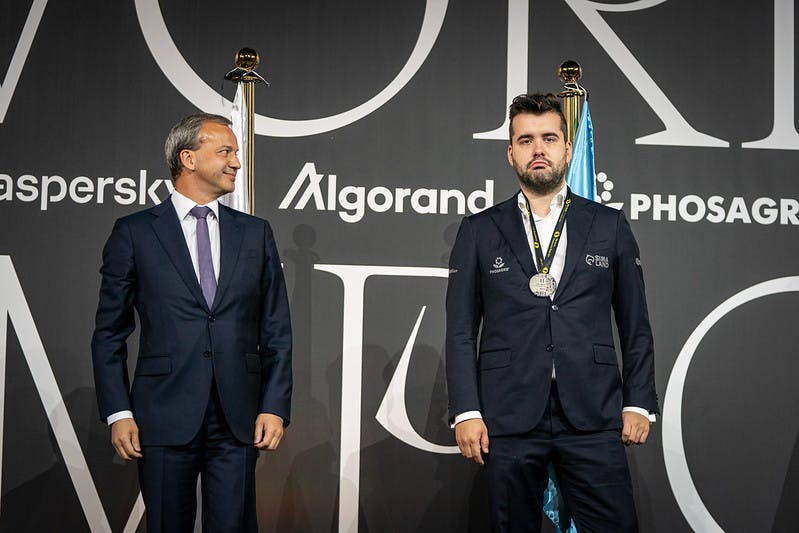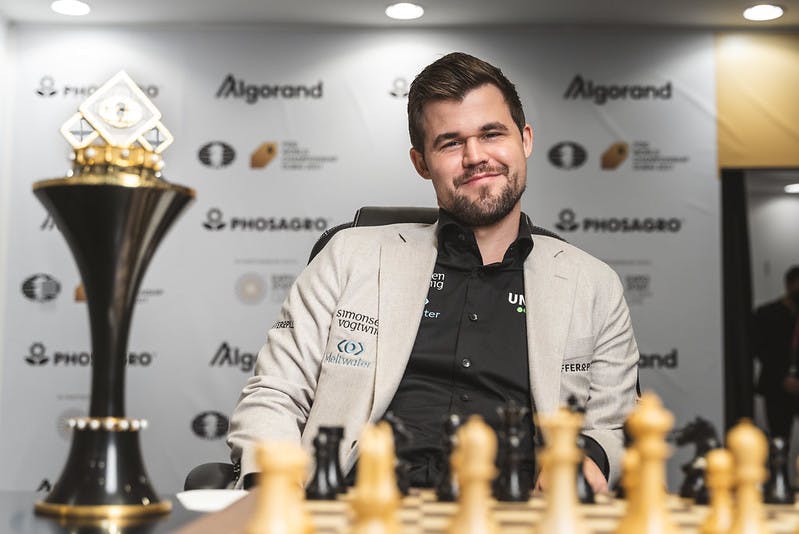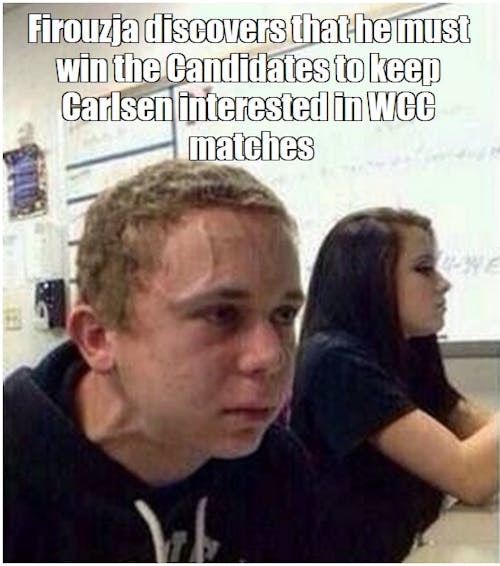Are you sure you want to delete your account?
(This will permanently delete all of your data - purchases, game scores, ratings, etc)
Change your username
Your current username is: guest
Change your account email address
Your current account email is:
Redeem your Fampay code here!
Use your Fampay code to get access to the Play Magnus Plus Membership!

How to Avoid Getting Burned Out During a Chess Event
A 2700+ GM once mentioned to me that he often loses interest in the tournament after 5 or 6 rounds. This phenomenon is well-known to many of us. What are the reasons, and how do we make sure we perform well in the last few rounds of the tournament?
As you probably know already, after five draws, Game 6 became pivotal in the recent World Chess Championship match in Dubai. Magnus Carlsen won a breathtaking marathon battle spanning a record 136 moves, after which Ian Nepomniachtchi collapsed and scored only one point in the following five rounds.

After adding the fifth World Chess Champion title to his collection, Magnus is smiling like a boss. Image by Niki Riga from the official site of the match.
For a more detailed report about the World Chess Championship match between Magnus Carlsen and Ian Nepomniachtchi, please check out the Magnus Trainer app.
First of all, during a tournament, you should always be feeling “hungry” for chess. This is typically ensured by taking a proper break between your studies and the following competition or between two events. In other words, if you get fed up with chess due to overworking or playing too much, your performance is likely to drop. This topic has been briefly touched upon in our last week’s blog post.
In contrast to this tip, Nepo played two exhausting training matches against former Challenger Sergey Karjakin before this year’s WCC. Unsurprisingly, at the very start of the match, Ian already looked tired and weary.
Secondly, monitor your health and wellbeing. While non-chess-playing individuals often ridicule the concept of chess being a sport, any competitive player will tell you how demanding the game is in the physical sense. The effects of having to sit and keep concentration for a few hours a day are often multiplied by the necessity to travel to the venue, to sleep and eat in an unfamiliar environment, by falling ill, etc. Summarizing, one should be fit and healthy to play well.
Comparing Ian and Magnus in this department, Magnus has a distinct advantage overall.
Even though Magnus has had some hiccups in his career, his nervous system seems to be much stronger than Ian’s.
Ian lost a lot of weight and worked on his physical shape a lot before the match. However, Magnus has been doing this for years and is generally believed to be fitter than his ex-Challenger.
I don’t know for sure what the sleep schedule of the players is like. From what I have heard and read, Magnus occasionally broke the schedule and stayed up very late in his childhood, but in general, his parents have explained to him the benefits of following a sleep routine. Meanwhile, Nepo makes the impression of someone who can easily stay well past midnight playing computer games and such. Once again, don’t take it for a fact; this is just an assumption.
Magnus has been known to take nutrition seriously, eat healthily and to bring his own cook to WCC matches. As far as I know, Ian is less “professional” in this sense and lives the life of an average person.
Thirdly, your psychological state often becomes the main culprit of your chess failure.
For example, suppose you decide to set yourself certain rating or point goals before the tournament, which is not recommended in most cases. In that case, it is remarkably easy to lose motivation once you understand that the aim is not achievable any longer.
Generally speaking, few of us can handle a rapid change in the narrative we created for ourselves before the event. Let’s stay you act like a typical action movie hero by visualizing your path to success which involves shredding all your opponents’ pieces to pieces. Well, how do you adjust if you lose the very first game terribly? Or if you shake off the defeat and lose again for some reason? This is a sophisticated subject, and it is hard to give universal advice. I am just saying that for some people having no plan for the event (“just play and enjoy every game!”) could be better than a rigid narrative (“I will win 5 games and draw 4, finishing at 7/9”).
Speaking for myself, I have had those tournaments where I had high expectations for my performance, planning to harvest a lot of rating points there. If things didn’t go according to plan, I would stubbornly try to force the issue and come back without analyzing what exactly went wrong and why. Quite often, such drastic measures backfire and cause even more painful defeats. Then you realize that meeting your goal is already unrealistic, and your mental shape goes from bad to worse!
Or, another common situation, something unpleasant might happen in your life and overshadow the importance of playing well. Top GMs have been going through lawsuits, divorces, political campaigns, and other distracting activities while competing in strong events. Obviously, their resulting performances tended to be abysmal. Of course, one can’t be insured against all sorts of hazards, but the rule of thumb is to try to adopt prophylactic thinking in life and chess. It will help you prevent some nuisances or abstain from entering a tournament at the wrong moment.

Ian’s face says it all during the awards ceremony. Image by Eric Rosen from the official site of the match.
Only Nepo knows what went wrong with his mindset after the catastrophe suffered in Game 6.
Did he start blaming himself for not winning with Black even though he had decent chances at some point?
Did he lose confidence in his chess abilities?
Did fear kick in? Everyone knows how tough it is to beat Magnus, and the challenge is almost insurmountable if you are trailing behind.
Did he fail to readjust his narrative of how the match will unfold? Maybe he hasn’t worked out in advance what he will do should Magnus take the lead. Or, quite possibly, he and his team did consider this scenario briefly, but in real life, everything turned out to be harder than on paper.
Did he…?
I guess that Ian should take a good rest and then analyze meticulously what went wrong in his head. This is the only way to fix the issue and to decrease the chance of it haunting him in the future.
Even though it is next to impossible to provide exact solutions to all the issues mentioned above within one article, I hope that the post gave you some tasty food for thought. Before playing your next tournament, make sure to go through the items mentioned in this article and see if you can improve in some areas.
Last but not least, we wish you a fantastic Christmas! Stay healthy, have fun with your family and friends, and don’t forget about chess should you be looking for some special gifts!


